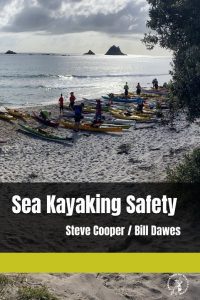Paddler Information - Safety
Sea kayaking is fundamentaly a safe activity provided that you take a little bit of time to understand a bit about the sport and the environment in which it is undertaken. Without this basic understanding it is very easy to get yourself into trouble. The information here should get you started in the right direction and also provide further information to enhance your safety and the safety of those around you.
- There are four distinct ‘cornerstones’ to staying safe whilst sea kayaking:
- Planning and preparation.
- Understanding the Environment.
- Knowing what to do when things go wrong and.
- Understanding your safety equipment.

For a more in depth look at environmental factors that affect safety whilst sea kayaking as well as safety equipment for sea kayaking take a look at the book “Sea Kayaking Safety”.
- Check out the Safer Boating Website for general information about boating safety
- KASK run a basic safety workshop around the country to raise awareness of these issues for people wanting to start kayaking and those who have recently taken up the sport, check out our KayakSafe NZ pages for more information.
- We have a safety blog page with user safety issues, please add any safety tips you may have to share using this form.
- Please contact us if you have more questions.
The videos on this page provide a good introduction to the basics of sea kayaking safety including; planning, what you need to know about the environment and what to do and what equipment you need if things do start to go wrong.
01 Introduction to the video series
When it comes to kayaking, safety should always be a top priority. The oceans, rivers and lakes around New Zealand are nothing short of breathtaking, however, they can come with their fair share of risks.
These videos give you an introduction about what you need to know…
02 Basic Gear, PFD, Paddle and Kayak
The foundation of kayak safety begins with selecting the right gear. It is important to choose the appropriate equipment for the type of kayaking that you will be participating in, including Personal Flotation Devices (PFDs), paddles, and kayaks.
03 Before you get on the Water, think W.E.T.
Before heading out on the water on your kayaking adventure, remember the WET acronym, a handy checklist to ensure you’re well prepared for your journey.
W – Weather: Stay updated on wind speed and direction, as well as wave and swell height.
E – Equipment: Pack essentials like your PFD, paddle, two forms of communication, appropriate clothing for the conditions, and any necessary safety equipment.
T – Tell Someone Your Plans: Always inform a trusted friend or family member (who is not going with you) about your kayaking plans, including your route and expected return time.
04 Safety on the Water
While on the water, safety isn’t just about gear, it’s also about responsible behaviour and effective communication.
Whenever possible, kayak with others. In a group, you can watch out for each other and offer assistance if needed.
Familiarise yourself with common paddle and hand signals to communicate with your fellow paddlers. This can help you convey information, make decisions, and stay safe.
05 What to do in an Emergency
Despite thorough preparation, emergencies can still happen so it’s essential to know how to react.
In case you capsize, make sure you have practiced appropriate self rescue techniques.
Carry a VHF radio and know how to use it, (you should do the maritime VHF operator’s course with the coastguard to learn the ins and outs of using a VHF. In an emergency, call for assistance on Channel 16.
06 What to do if You Capsize
Sit in Sea Kayak
If you can’t get back into or onto your kayak after you capsize and exit it then you are going to be in a lot more trouble so please also check out these two videos that are on YouTube which give a good overview of getting back into a sit in kayak and onto a sit on top. It’s not as easy as it looks and needs to be practiced.
Sit on Top Kayak
Surf Zone Safety – Check out our series of videos about how to handle yourself safey in the surf zone
